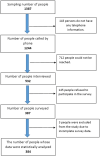COVID-19 vaccine hesitancy: A community-based research in Turkey
- PMID: 33973322
- PMCID: PMC8237055
- DOI: 10.1111/ijcp.14336
COVID-19 vaccine hesitancy: A community-based research in Turkey
Abstract
Aim: The frequency of vaccine refusal and hesitation, which is associated with many factors, is increasing worldwide. The purpose of this study is to estimate the frequency of vaccine refusal against COVID-19 vaccines and to identify the underlying factors for refusal or hesitation.
Materials and methods: This is a cross-sectional study carried out in a district of Istanbul from 25 to 30 December 2020. A sample of people from the ages of 20 to 85 in the district was selected, and a total of 384 people were enrolled. A questionnaire about the COVID-19 vaccine was administered to the participants by phone. The questionnaire consisted of questions about the sociodemographic characteristics of participants and their thoughts about possible COVID-19 vaccines.
Results: 45.3% of the participants were hesitant about getting the COVID-19 vaccine, which was declared appropriate by the Ministry of Health. The rate of those who think that the COVID-19 vaccine will be effective in preventing and controlling the disease was 51.6%. 89.6% of the participants were hesitant about getting their children vaccinated. Those who do not consider COVID-19 disease as a risk to their health were 22.9%, and 32.8% thought that they would be protected from the disease by natural and traditional ways. The median score of the participants' risk perception was 7 (IQR: 6-8; Mean: 6.8; SD: 1.7). The median value of risk perception score of those who accept the vaccine was 6 (IQR: 4-6), while the median value for those who did not accept the vaccine was 4 (IQR: 4-6) (P < .01). Factors affecting vaccine acceptance were determined as the perception of risk (OR: 1.26% 95CI 1.03-1.55) and age (OR: 0.94% 95CI: 0.91-0.98) in logistic regression analysis.
Conclusion: Half of the participants were hesitant about the COVID-19 vaccines. The success of COVID-19 vaccination programmes largely depends on the public willingness to accept the vaccine.
© 2021 John Wiley & Sons Ltd.
Conflict of interest statement
None.
Figures
Similar articles
-
Who is hesitant about Covid-19 vaccines? The profiling of participants in a French online cohort.Rev Epidemiol Sante Publique. 2022 Jun;70(3):123-131. doi: 10.1016/j.respe.2022.02.004. Epub 2022 Mar 28. Rev Epidemiol Sante Publique. 2022. PMID: 35428543 Free PMC article.
-
Evaluation of COVID-19 Vaccine Refusal in Parents.Pediatr Infect Dis J. 2021 Apr 1;40(4):e134-e136. doi: 10.1097/INF.0000000000003042. Pediatr Infect Dis J. 2021. PMID: 33410650
-
Willingness to Be Vaccinated against COVID-19 in Spain before the Start of Vaccination: A Cross-Sectional Study.Int J Environ Res Public Health. 2021 May 15;18(10):5272. doi: 10.3390/ijerph18105272. Int J Environ Res Public Health. 2021. PMID: 34063476 Free PMC article.
-
COVID-19 vaccine hesitancy and related factors among primary healthcare workers in a district of Istanbul: a cross-sectional study from Turkey.Fam Med Community Health. 2022 Apr;10(2):e001430. doi: 10.1136/fmch-2021-001430. Fam Med Community Health. 2022. PMID: 35470223 Free PMC article.
-
How evolutionary science can help us understand vaccine refusal in the COVID-19 pandemic.BJPsych Bull. 2023 Aug;47(4):224-228. doi: 10.1192/bjb.2022.36. BJPsych Bull. 2023. PMID: 35818884 Free PMC article. Review.
Cited by
-
Knowledge, Beliefs, and Intention to Vaccinate against COVID-19 among the Seventh Day Adventists in Southeast Asia Region.Acta Med Philipp. 2023 Jun 28;57(6):18-23. doi: 10.47895/amp.vi0.4549. eCollection 2023. Acta Med Philipp. 2023. PMID: 39483695 Free PMC article.
-
COVID-19 vaccine hesitancy among parents in Low- and Middle-Income Countries: A meta-analysis.Front Public Health. 2023 Feb 15;11:1078009. doi: 10.3389/fpubh.2023.1078009. eCollection 2023. Front Public Health. 2023. PMID: 36923043 Free PMC article.
-
Determinants of parents' intention to vaccinate their children aged 12-17 years against COVID-19 in North Kivu (Democratic Republic of Congo).Hum Vaccin Immunother. 2023 Dec 31;19(1):2179788. doi: 10.1080/21645515.2023.2179788. Epub 2023 Mar 2. Hum Vaccin Immunother. 2023. PMID: 36864602 Free PMC article.
-
The impact of health literacy on COVID-19 immunization.Hum Vaccin Immunother. 2023 Aug;19(2):2254539. doi: 10.1080/21645515.2023.2254539. Epub 2023 Oct 9. Hum Vaccin Immunother. 2023. PMID: 37814493 Free PMC article.
-
Dark Triad and COVID-19 vaccine hesitancy: the role of conspiracy beliefs and risk perception.Curr Psychol. 2023 Mar 31:1-13. doi: 10.1007/s12144-023-04609-x. Online ahead of print. Curr Psychol. 2023. PMID: 37359671 Free PMC article.
References
-
- World Health Organization (WHO): Coronavirus Disease (COVID‐19) Dashboard. https://covid19.who.int/. Accessed January 2021.
-
- Ministry of Health of Turkey Covid‐19 Patient Table. https://covid19.saglik.gov.tr/. Accessed January 2021.
-
- Ministry of Interior . Within the Scope of Combating Coronavirus—Circulars on New Restrictions and Measures. https://www.icisleri.gov.tr/koronavirus‐ile‐mucadele‐kapsaminda‐sokaga‐c.... Accessed January 2021.
MeSH terms
Substances
LinkOut - more resources
Full Text Sources
Other Literature Sources
Medical

